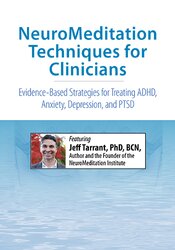
×

One-size-fits-all meditation is a myth.
Every client stands distinct, with their own history, physiology, background, and aspirations.
Research sheds light on meditation’s role in addressing common clinical concerns—such as anxiety and depression—while actively reshaping the brain’s structures.
Yet, meditation can remain shrouded in mystery, leading to difficulties in maintaining a consistent practice.
NeuroMeditation is an approach that demystifies meditation by unraveling its ‘how’ and ‘why’. It equips you with powerful clinical tools to help you guide clients towards tailored meditation routines, perfectly aligned with their unique needs.
As clients tangibly experience the benefits, their dedication to regular practice naturally deepens, unlocking even more profound rewards.
Watch Jeff Tarrant, PhD, BCN—author and founder of the NeuroMeditation Institute—as he delves into potent meditative techniques that address mood, anxiety, attention, pain, and self-perception. You’ll also learn:
Leave this training with the knowledge and skill to effectively identify and design meditation-based interventions to support a wide range of clients in your clinical work!
Purchase now!
All members of the PESI, Inc. planning committee have provided disclosures of financial relationships with ineligible organizations and any relevant non-financial relationships prior to planning content for this activity. None of the committee members had relevant financial relationships with ineligible companies or other potentially biasing relationships to disclose to learners. For speaker disclosures, please see the faculty biography.
Continuing education credit information is coming soon for this non-interactive self-study package.
CEs may be available for select professions, as listed in the target audience. Hours will be dependent on the actual recording time. Please check with your state licensing board or organization for specific requirements.
There may be an additional fee for CE certificates. Please contact our Customer Service at 1-800-844-8260 for more details.
**Materials that are included in this course may include interventions and modalities that are beyond the authorized practice of your profession. As a licensed professional, you are responsible for reviewing the scope of practice, including activities that are defined in law as beyond the boundaries of practice in accordance with and in compliance with your professions standards.
| File type | File name | Number of pages | |
|---|---|---|---|
| Manual - NeuroMeditation Techniques for Clinicians (9.6 MB) | 71 Pages | Available after Purchase |

Jeff Tarrant, PhD, BCN, is a licensed psychologist, and senior fellow board certified in neurofeedback. He is the founder and CEO of the NeuroMeditation Institute (NMI), LLC and provides certification training for NMI therapists and instructors.
Dr. Tarrant is the author of Meditation Interventions to Rewire the Brain and recipient of the First Person Science Award from the Foundation for Neurofeedback and Neuromodulation Research. Dr. Tarrant specializes in teaching, clinical applications, and research combining technology-based interventions with meditative states for improved mental health. His research, featured in more than 20 book chapters and research articles, focuses on exploring brainwave changes that occur as a result of contemplative practices, technological interventions, and non-ordinary states of consciousness. In addition to his clinical background, Dr. Tarrant has also trained extensively in a variety of spiritual and meditative practices, including Zen, Vipassana, Taoism/Qigong, Arhatic Yoga, and Mindfulness-Based Stress Reduction (MBSR).
Speaker Disclosures:
Financial: Dr. Jeff Tarrant is the CEO of the NeuroMeditation Institute. He is the Chief Scientist and part owner of Healium, and he is part owner of Neuphony. He is a scientific advisor for Divergent Technologies. Dr. Tarrant receives a speaking honorarium, book royalties & recording royalties from PESI, Inc. He is a published author and receives royalties from Taylor & Francis.
Non-financial: Dr. Jeff Tarrant has no relevant non-financial relationships.
Access never expires for this product.
Visit our FAQ page at https://www.pesicanada.ca/faq or contact us at https://www.pesicanada.ca/contact-us.
Your Brain on Meditation
Focus: Strategies to Build Concentration & Self-Monitoring
Mindfulness: Strategies to Manage Stress and Anxiety
Open Heart: Strategies to Improve Mood
Quiet Mind: Strategies for the Busy Brain
Integrate NueroMeditation in your Clinical Practice
Satisfaction Guarantee
Your satisfaction is our goal and our guarantee. Concerns should be addressed to info@pesicanada.com.
Please wait ...